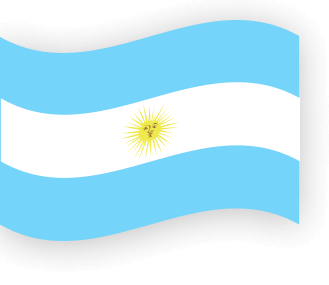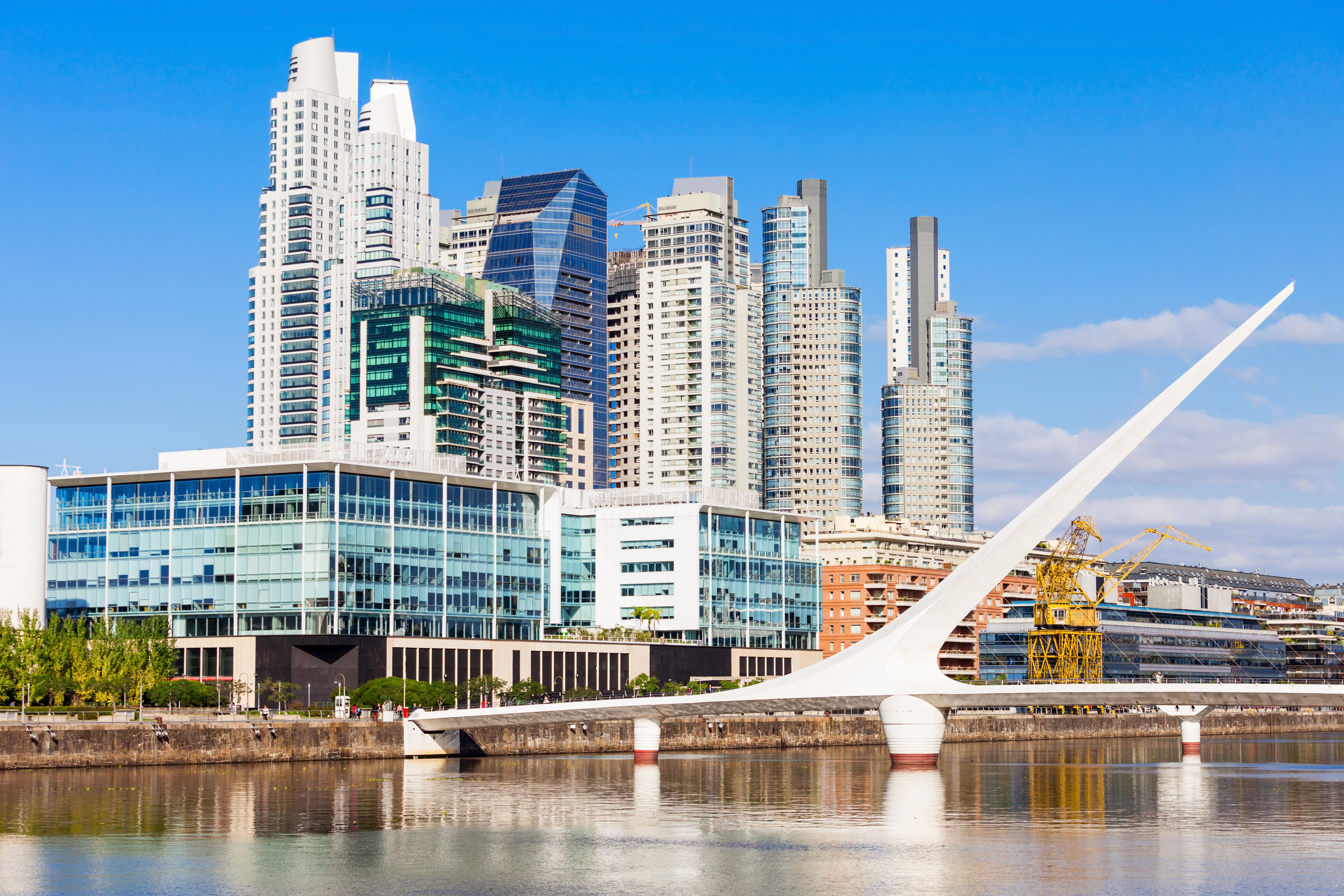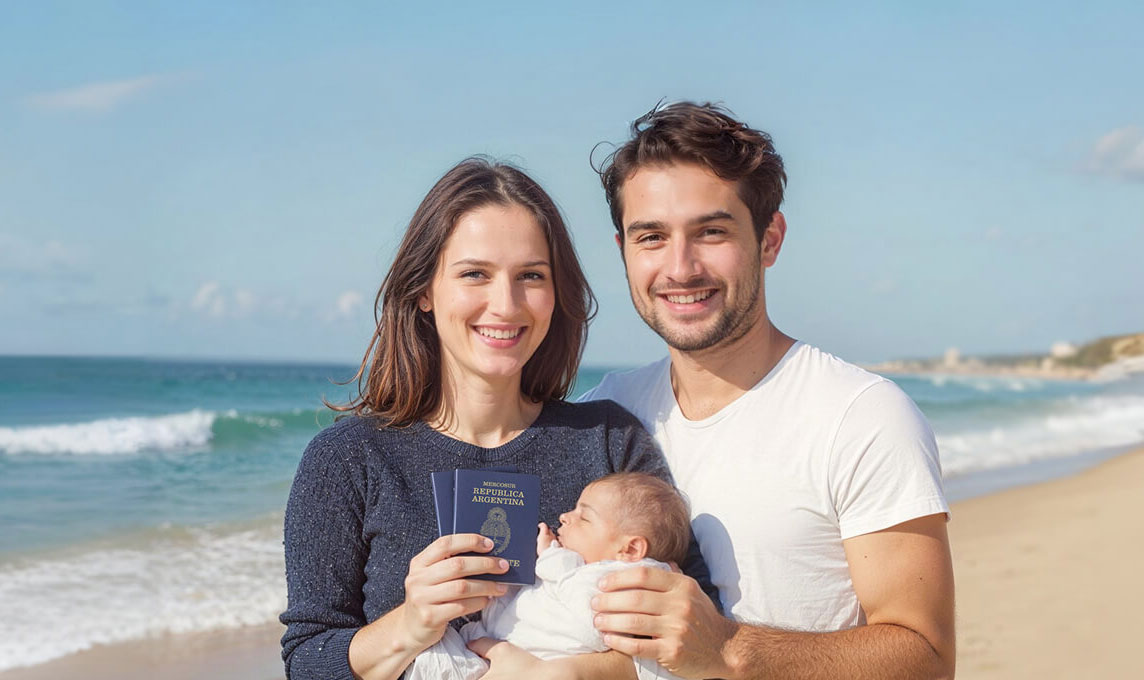A residence permit in Argentina allows the permit holder to live in the republic for 1-3 years without additional requirements and have access to the labor market, education, free medicine, and social assistance. This status can be extended and counted toward the naturalization period for subsequent Argentine citizenship registration. The rules for granting a residence permit are regulated by local law No. 25871 “On Migration”.
To obtain a residence permit, a foreigner must meet one of the legal requirements: employment, university admission, religious or scientific research activities, investment, medical treatment, or financial independence. Applicants should ensure they comply with local legislation, collect the necessary documents, and contact the National Migration Department.

One popular way to obtain an Argentine residence permit is through the birth of a child. receive citizenship immediately, and their parents receive a residence permit with the right to a passport.
The demand for an Argentine residence permit
Argentina is a popular destination for migrants due to its accessible immigration policies, which allow foreigners to live in one of the most developed countries in Latin America for 12-36 months, with the opportunity to extend their stay. The country attracts foreigners with its low cost of living, free medicine (or medicine covered by medical insurance for an expanded list of services), and the prospect of obtaining citizenship for themselves and their family members.
A temporary residence permit in Argentina provides immigrants with the following benefits:
- The right to stay in the Republic for a certain period of time (depending on the purpose of the stay), leave and return without restrictions, renew the visa;
- Protection of personal and property rights on an equal basis with local citizens;
- Access to health care, education, the justice system, and the labor system;
- Assistance with integration into society, social support (if applicable);
- The opportunity to reunite with family members (spouse or children) and register their temporary resident status.
Types of residency in Argentina
Temporary resident status in Argentina is called Residencia temporaria. Holders of temporary or permanent residence permits can apply for a DNI (Documento Nacional de Identidad), an identity card that resembles a plastic ID card with an individual number, expiration date, personal information, color photograph, and encrypted fingerprint.
Immigrants in Argentina can also obtain two types of residence permits (or rather, their analogues):
- residencia precaria — access to stay in the republic during the consideration of an application for a residence permit with the right to work, study, and re-entry;
- residencia transitoria — an alternative to a long-term national visa with the right to reside in Argentina for up to 90 days without access to employment and multiple entries (issued to tourists, transit passengers, and international crews).
Legal grounds for obtaining residency in Argentina
The methods for obtaining a residence permit are regulated by local law No. 25871, “On Migration.” Foreigners have the right to obtain a residence permit for employment, study, or as academics, investors, or family members of local citizens and residents. Residence permits are granted to researchers, financially independent individuals, retirees, religious figures, artists, and athletes. You can also obtain a residence permit for humanitarian reasons, such as medical treatment or asylum, as well as in special cases not regulated by law.
Work residency
Individuals who are officially employed by local companies can obtain a temporary residence permit in Argentina. The document is valid for up to three years with the right to extend. A foreigner’s legal paid activity must be confirmed by an employment contract or its equivalent.
Residency for financial independence
Argentina provides a residence permit, or rentier visa, to individuals with a stable, permanent income that is at least five times higher than the current minimum wage (for 2025, this is at least USD 1,170 per month). The main requirement is that the funds are legally obtained and can be proven with documents. The residence permit is valid for up to 36 months and can be renewed. This type of residence permit does not allow the foreigner to seek employment.
Residency by investment
Foreign investors have the right to apply for residency in Argentina for up to three years, with the opportunity to extend it. The required financial investment is approximately USD 1,735 (ARS 1,500,000). Investments must be made legally and documented in the economy of the Republic. First, the applicant must prepare an investment project and have it approved by the migration service.
Purchasing real estate in Argentina does not entitle one to a residence permit.
Specialized professions and activities
Argentine residence permits are available for scientists, researchers, research associates, and technical or consulting specialists. An immigrant may obtain resident status based on an invitation from a private or public company to perform specialized tasks. A residence permit is issued for a maximum of 3 years but can be renewed.
Citizenship, residence permits, and business relocation anywhere in the world:
- Live and travel throughout the world;
- Grow your business;
- Provide your children with an education at the world’s best universities.
Intra-company transfer
Qualified specialists and administrators of international commercial or industrial organizations have the right to apply for an Argentine residence permit. The applicant must receive a salary in the Republic of Argentina, and their intra-corporate transfer must be documented. The standard validity period for resident status is three years.
Residency for creative or sports activities
A residence permit in Argentina is granted to artists and athletes who arrive to perform professional tasks in the Republic. The resident status is valid for a maximum period of 3 years, with the opportunity to extend it. During the process of drawing up the dossier for a residence permit, the immigrant’s activity is also documented.
Residency for religious activity
Argentina welcomes believers of various officially recognized international faiths. Applicants must provide evidence of planned religious activities within the territory of the Republic, such as an invitation from a local religious group certified by the Ministry of Foreign Affairs. The residence permit is valid for a maximum of 36 months and can be reissued.
Residency for medical treatment
Foreigners requiring inpatient treatment at a local medical facility may visit Argentina and stay for up to 12 months. Applicants must confirm the planned procedures with a certificate from the hospital. If the applicant is a minor or incapacitated, he or she may request a residence permit for an accompanying person (a close relative or an official representative).
Residency for academic purposes
Licensed academics may visit Argentina upon concluding an agreement with a local university specializing in their field (e.g., medicine or technology). The work contract is attached to the general dossier by the applicant. The residence permit is valid for one year. An academician can extend the residence permit for another 12 months as long as the basis for staying in the Republic is still valid.
Residency for education
An Argentine residence permit is issued to individuals arriving in the Republic to pursue secondary or higher education. Resident status is valid for 24 months and can be renewed until the end of the educational process. Applicants must submit a certificate from a university or similar institution along with the basic list of documents.
Humanitarian residency grounds
Argentina recognizes refugees and offers them international protection, including the right to obtain a two-year residence permit. Subsequent residency extensions are available to applicants with permission from the relevant authorities for humanitarian reasons. A residence permit can also be registered for individuals of interest to the local Ministry of Foreign Affairs and Religion.
Residency for citizens of Latin America
Individuals holding passports from Chile, Bolivia, or any of the states belonging to the Latin American economic and political association MERCOSUR (Mercado Común del Sur) can obtain a residence permit in Argentina. This category of immigrants does not require special grounds for staying in the Republic. A residence permit is issued to the applicant for a period of two years, with the opportunity to extend it multiple times.
Special residency grounds
In exceptional cases, the Ministry of Internal Affairs and/or the Ministry of Foreign Affairs may grant an Argentine residence permit to individuals who do not have grounds for staying in the Republic, but who are of interest to local authorities. Each case is considered on an individual basis by the relevant authorities.
Residency by family reunification
Legal residents have the right to invite their parents, spouses, and unmarried children under 18 to Argentina and obtain a residence permit for them. Residence permits are also available for other relatives of the host in special cases, such as if they are incapacitated or unable to provide for themselves.

How to choose the best path to legal residency
To find the best option for obtaining resident status in Argentina, a foreigner should consider the processing times, the residence permit’s validity period, and the associated costs. Suitable immigration programs depend on the applicant’s income level, plans for staying in the country, family status, and professional or special skills.
| Legal grounds for obtaining a residence permit | Cost of the procedure | Special conditions |
|---|---|---|
| Employment, special activities, creative, religious, academic | State duties (from USD 7) | Invitation to perform professional tasks from an institution in Argentina. |
| Financial independence | From USD 140 | Stable permanent income from abroad. |
| Investment | From USD 1735 | Drawing up an investment project. |
| Family reunification | State duties (from USD 7) | Having relatives who are citizens or residents of Argentina. |
| Humanitarian reasons | Individually based | Grounds for requesting asylum in Argentina, usually on the basis of a special ban on visiting one’s home country. |
| Education | From USD 3000 (at private universities) | Required to complete an educational course. |
Lawyers can help applicants thoroughly understand the specifics of foreign immigration legislation and determine the best way to obtain a residence permit.
Specialists in international law simplify the process by assessing applicants’ requests on an individual basis and advising them on for their situation.
Argentina residency requirements
An applicant for temporary resident status in Argentina must meet the following requirements:
- Have the legal grounds for obtaining a residence permit and the corresponding dossier;
- Cross the state border legally (the application is submitted within the Republic);
- Have no criminal record in any state where the applicant has lived for at least 12 months within the 3 years prior to submitting the application;
- Be of legal age or have legal representatives participating in the procedure;
- Register a place of residence in Argentina upon arrival.
Additional requirements for applicants of Argentine residence permits depend on the basis on which the request is submitted. For example, individuals arriving to perform professional tasks must provide proof that their future employer is registered in the DNM (Dirección Nacional de Migraciones) Unified Register of Foreign Applicants. Scientists and academics must have appropriate international-level accreditation.
Documents needed for a residence permit
The standard dossier for obtaining a temporary Argentine residence permit includes the following:
- A valid identity document, usually a passport, and photocopies;
- Confirmation of legally crossing the Argentine border (entry stamp);
- A certificate of no criminal record from the country of origin;
- A certificate of registration of a place residence in the Republic;
- A color photo measuring 4 x 4 cm;
- Proof of eligibility for a residence permit, such as an employment contract, medical history, a letter of recommendation from an authorized representative of a religious organization, or a certificate proving regular receipt of a retirement pay.
Immigrants must have documents issued abroad authenticated by the Argentine consulate, the Ministry of Foreign Affairs, or an apostille if their country of residence has ratified the Hague Convention. Applicants must translate certificates in a foreign language into Spanish with the help of a public translator certified by the Argentine government.
Step-by-step: How to get residency in Argentina
- Study migration legislation and get ready to apply
A foreigner analyzes Argentina’s laws regarding migrants, determines a suitable basis for staying legally in the country, ensures that the requirements are met, and compiles the necessary documents.
- Obtain an entry permit
To legally cross Argentina’s border, the applicant must request a visa according to the basis for subsequently obtaining a residence permit. The immigrant submits the request to the consulate or embassy of Argentina in their country of residence. The cost of the document is approximately USD 3. Although the processing period is not regulated by law, immigrants’ reviews indicate that requests are typically processed within two weeks. Residents of countries with a visa-free regime with Argentina can bypass this step.
- Moving and applying for a residence permit
Based on an entry permit or visa-free regime, applicants move to Argentina and register on the official website of the National Migration Directorate. To apply for a residence permit, the applicant must upload an electronic dossier according to the type of permit requested and fill out an application. The immigrant can find a sample of how to fill out the form on the same website.
- Complete the payment process and wait for a decision
After submitting the application, the applicant uploads a receipt for the state fee payment of USD 7 to the migration service website. The online operator will process the dossier and send the applicant information about the place and time of the personal meeting at the directorate office. The applicant will also receive residencia precaria, which allows them to stay in the republic while their application for a residence permit is being processed.
- Visit to the National Migration Directorate
On the appointed date, the immigrant arrives at the nearest office of the migration service to present original documents for a residence permit and submit biometric data (fingerprints). An authorized officer will also take a photo of the applicant.
- Review of the application and obtaining an identity card
Although the processing time for requests from foreigners for resident status in Argentina is not regulated by law, the procedure usually takes 1 to 3 months. If the application is approved, the applicant receives a national identity card (DNI), which confirms permission for temporary residence in the Republic.
Renewing residency and obtaining permanent residency in Argentina
Most temporary residence permits in Argentina require renewal if the immigrant has a legal reason to stay in the country. Applicants must submit the relevant dossier to the National Migration Directorate in advance. This dossier includes proof of legal subsequent stay in the country, such as a certificate from a university or an employment contract.
After three years of legal residence in Argentina with a residence permit, immigrants can apply for permanent residence. They obtain the status by reapplying to the migration service with a complete file and a receipt for the state fee payment. Holders of permanent residence permits acquire almost the same rights as Argentine citizens, except the right to vote in elections, run for office, and apply for certain government positions.

With a long-term residence permit, immigrants have the right to import personal belongings, property, and vehicles into Argentine territory without paying customs duties. Permanent residence status is granted immediately to relatives (children and parents) and spouses of local citizens, even if they have not previously resided in the country.
Refusal or revocation of residency status in Argentina
A residence permit in Argentina is not granted to individuals with convictions for serious crimes (imprisonment under local law) in any country, or who are connected with terrorism, genocide, or war crimes. Resident status is not granted to applicants who are associated with human trafficking or who have violated the migration legislation of the Republic. A residence permit is also denied to immigrants who are banned from visiting Argentina or who submit a false dossier when requesting the status.
A residence permit in Argentina can be revoked if the holder receives a conviction of 5 years or more, or if they commit repeated criminal acts. The document loses its validity if it is determined that it was obtained fraudulently. Staying abroad without prior approval from the local authorities for 12 months or more also leads to cancellation of the residence permit. After losing their residence permit, foreigners receive an order to leave Argentina within a specified period. If they violate the order, they will be forced to leave the country and will be banned from re-entering for a period of five years.
Immigrants often make mistakes when compiling a dossier, filling out the form, or failing to understand the applicant requirements, which results in a refusal to grant the residence permit. International law specialists can assist applicants in acquiring resident status abroad with minimal effort.
Professional assistance with residency in Argentina
With the support of international law specialists, applicants can obtain resident status abroad. Migration lawyers take an individualized approach to each case, thoroughly analyzing the applicant’s situation and needs. They recommend the best options for quick immigration and provide detailed information about the pros and cons of each method.
Experienced iWorld specialists accompany clients at every stage of acquiring the desired status, from document preparation to visits to authorized government agencies. Our lawyers understand the immigration laws of different countries and can help guarantee the quick registration of citizenship or residency.
Any questions left
Ask them to an immigration lawyer for free















